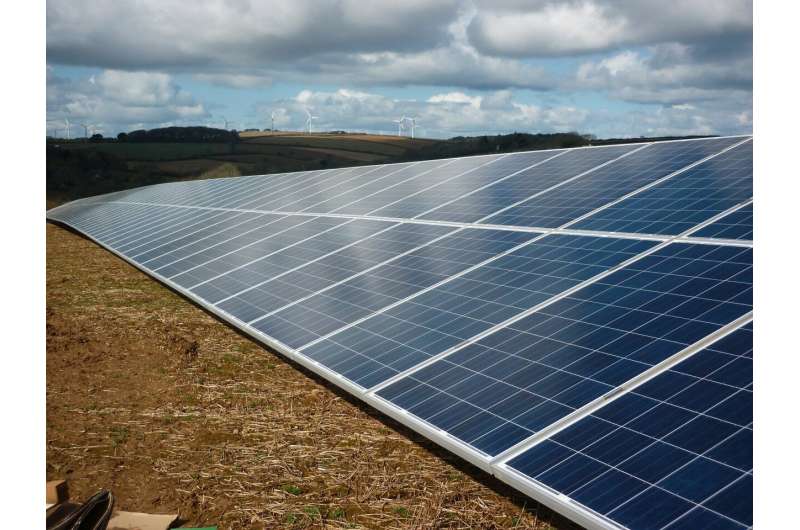This article has been reviewed according to Science X's editorial process and policies. Editors have highlighted the following attributes while ensuring the content's credibility:
fact-checked
trusted source
proofread
What environmental equality in Africa really looks like

The just energy transition is meant to be an equal, democratic process where the world gradually moves toward lower carbon technology. Green technologies are reliant on minerals such as cobalt and lithium that are abundant in some African nations. There is a concern that this revolution will produce a new scramble for these commodities and that the rich will simply exploit poorer nations using their wealth and influence.
"The big global players are positioning themselves to control access to these resources," warns Professor Imraan Valodia, Pro Vice-Chancellor: Climate, Sustainability and Inequality, and Director of the Southern Center for Inequality Studies (SCIS) at Wits University. "The amount of funding being pumped into this is huge."
Industrializing Africa
The United States' Inflation Reduction Act of 2022 has allotted $663 billion for climate action investments. Part of this is aimed at stimulating manufacturing in the green economy, which in turn will require certain specific materials. But while countries like China and the U.S. are spending their way to a greener future, it is Africa that needs to transform and mitigate climate change.
"Africa has to industrialize if it doesn't want to be a provider of raw materials, and it needs to take the green path," says Professor Dean Brady in the School of Chemistry at Wits.
"This is for two reasons: One being we need to prevent climate change as, according to the Wits Global Change Institute, southern Africa is particularly vulnerable because of its geographical location and its rate of socioeconomic development. Secondly, green technologies tend to be more efficient by definition [they produce less waste] and therefore are more competitive."
Brady believes that countries like South Africa can fund this in part through ring-fencing green taxes, such as the carbon tax.
Protectionist tariffs undermine Africa
Valodia believes that the use of green technologies to industrialize will become urgent for developing countries, because developed nations are introducing protectionist tariffs to safeguard their economies as they de-carbonize.
An example of this is the Carbon Border Adjustment Mechanism (CBAM), a European Union tariff on imported, carbon-intensive products like steel, cement, and aluminum which will come into effect in 2025.
"The basic plan with CBAM is that, for example, if you import a car into the EU, they can calculate backwards the amount of carbon used in its manufacture and tax you on this," explains Valodia. This means an add-on cost for local exporters putting an estimated R53 billion of South African exports at risk in the short-term.
The U.K. is planning to introduce a similar carbon tariff in 2027, and other countries, like Canada, Japan and the U.S., are in the process of introducing their own such border taxes.
"The rich nations need to finance this adjustment in countries in the Global South rather than expecting us to bear the burden on our exports," says Valodia.
Opaque funding 'aid'
Even the aid provided by wealthier countries to help move developing countries to green economies has been found wanting. At COP27, the 27th annual UN meeting on climate, several European countries and the U.S. announced an $8.5 billion funding package to help South Africa in its just transition in the energy sector.
In an article published in March 2024 titled, "What happened to the Just Energy Transition grant funding?," Valodia and SCIS colleagues Katrina Lehmann-Grube, Julia Taylor, and Sonia Phalatse took a closer look at this funding package. What they found was that only 4% of the total amount was grant financing with most of the balance comprising concessional loans.
"Most of it is funding packaged as technical support that is actually going to institutions in their own countries, not to us," says Valodia. "There needs to be proper commendatory schemes that go to the people that need it, rather than grand schemes that just benefit people in the north."
Funding Africa's just transition
But countries in the Global South are fighting back and BRICs countries have strongly opposed the introduction of CBAM. Their primary concern is that the risks associated with the tariff will not be equally distributed across the globe.
It has been suggested that certain concessions could be negotiated between South Africa and the European Union, where our existing climate change mechanisms, like green taxes, are used as an off-set.
There is also more funding money available that could be accessed, although some of this funding is controlled by the big powers.
At COP28 in 2023, it was decided to formally establish a loss and damage fund to support vulnerable countries to deal with the effects of climate change. The decision to make the World Bank the administrator of the fund was a controversial one of concern to many developing countries, given that the United States is the finance institution's largest shareholder and the only country that has veto powers to change the structure of the Bank. Another option was for the United Nations to administer such a fund.
Still, South Africa needs to find a way to speed itself to a green future. "The sooner we do this, the better for us," says Brady. "Africa is projected to be the most populous continent by the end of the 21st century and we really need to industrialize with efficient and non-polluting technologies for any chance of a healthy and wealthy future. There have already been a lot of missed opportunities."


















